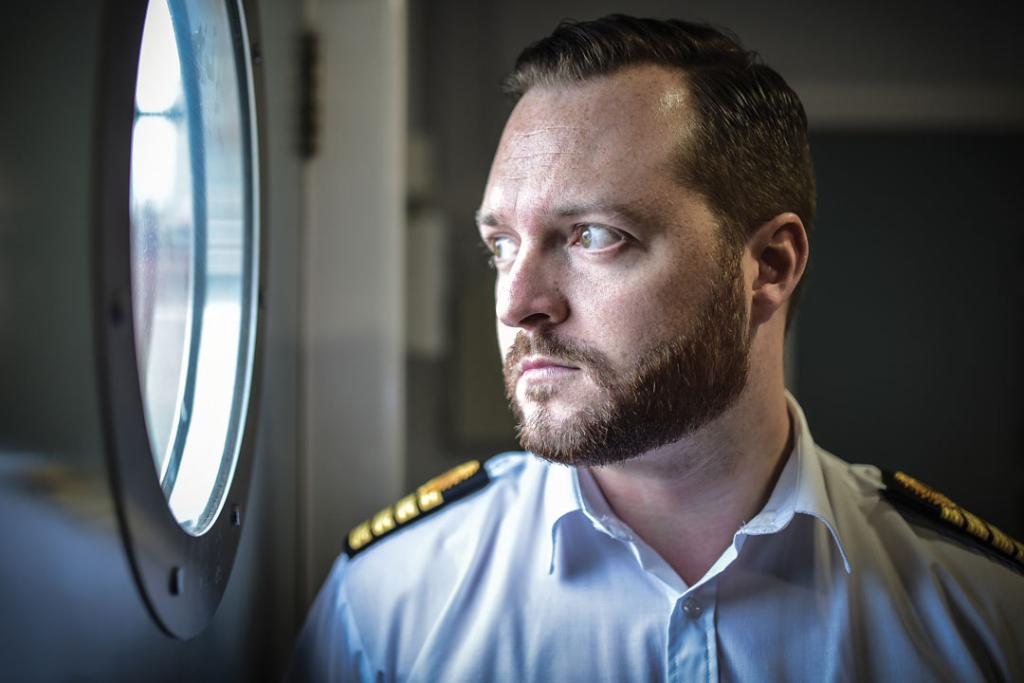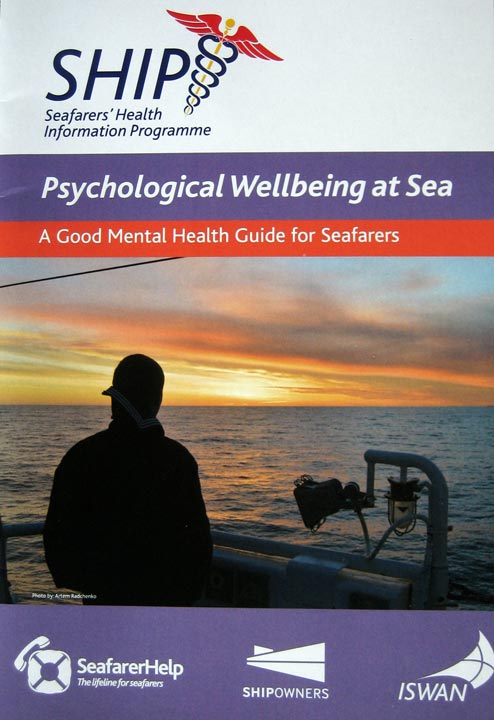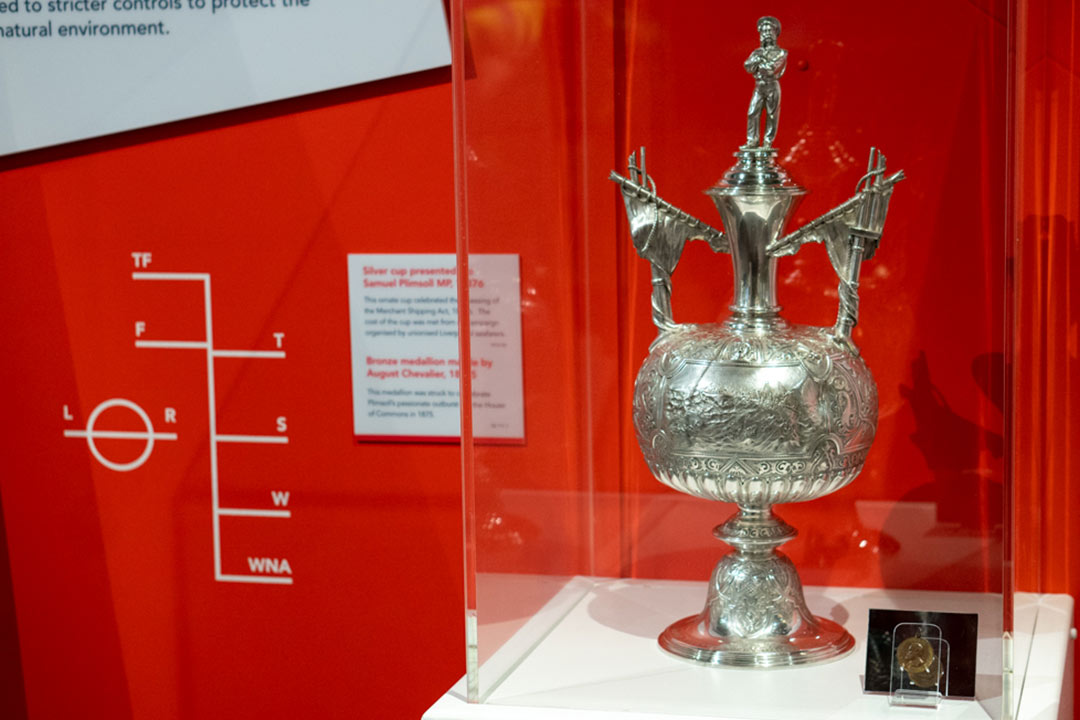Mental health and modern seafaring
In the second of two articles for World Mental Health Day, we take a look at how the challenges of life at sea can affect seafarers’ mental health, a subject which is explored in the Life on Board gallery at our Maritime Museum.

Photo © Sailors' Society
Please note: this article discusses mental health and suicide. If you are affected by what have you read, please get in touch with one of the support services listed at the end of the article.
Don’t suffer in silence.
A dangerous, isolated environment
This has been a year to try anyone’s mental health. Isolation, fear and uncertainty, are all terrible for our mental wellbeing. Imagine though if isolation and danger were the norm, just a part of your job.
Seafaring is one of the most dangerous professions on earth, thought to be second only to deep sea fishing. Both have in common the environment of the sea. Beautiful, beguiling, vast and deadly, the sea is a working environment like no other and the ITF (International Transport Workers' Federation) estimates it claims the lives of 2000 seafarers on cargo ships every year. It is still unusual though to see this covered in the western media.
Modern container ships have grown exponentially in size, while crews are relatively small and drawn from all over the world. Though this can be a wonderful opportunity for cultures to interact and learn from each other, it can also come with misunderstandings, insurmountable language or cultural barriers, and out and out racism. A ship is a community, one that you can’t choose to leave easily once at sea. Turnaround times for cargo ships have been greatly reduced, meaning the vital shore leave is often restricted or lost completely. Imagine you are at work and you cannot go home, even at night you are on call if something urgent happens, you may not be able to understand some of your colleagues and there’s no calling the emergency services if something goes wrong. Shifts are long, fatigue common, and your mistakes could kill not only yourself but all those in your community. Do you feel trapped? Isolated? Uncertain? Afraid?
Support for seafarers
Perhaps having thought about that you might find the following statistic less surprising. Seafaring is recorded by the World Health Organisation (WHO) as the profession with the second highest rates of suicide, those rates tripled between 2014 and 2017. This despite improvements brought about in seafarers’ lives via modern technology. In the past, seafarers would be out of communication with their loved ones for weeks or months at a time. Internet and satellite phones have allowed seafarers to remain more connected than ever before. They have also offered a route to accessing support and advice for those who are struggling. Apps like Wellness at Sea and literature freely available online from organisations such as ISWAN (International Seafarers' Welfare and Assistance Network) and the ITF aim to tackle the mental health and wellbeing of seafarers. They also look to offer them help and practical advice regarding their rights and the availability of legal assistance.

Our mental health is massively impacted by our circumstances and environment. We cannot change the sea, we cannot control one of the most challenging environments on earth. We can mitigate against the danger and unpredictability though. Long shifts, small crews, ever faster turnarounds - none of these things are conducive to crew wellbeing.
A study of stress conducted in the port of Rotterdam observed "seamen have a lower life expectancy and more psychiatric illness, an increased risk for high cholesterol, for hypertension, neurosis, and stomach complaints, liver cirrhosis, suicide and alcohol abuse."
We are, and have long been, reliant on these men and women who bring us, here in Britain, 90% of everything. Studies like this one are revealing at just what personal cost they may be doing so.
Coronavirus has shown us there is still a need for a sea change in the public perception of seafaring. Whilst other key workers were rightly praised, seafarers have remained largely forgotten and sometimes literally abandoned. Almost 150 years ago, in his Appeal for Seamen, campaigner Samuel Plimsoll pointed out that, though many ship owners were honourable:
"There are in every large class of men some who need the law’s restraint – who, without it, have no hesitation in exposing others to risk, if by doing so they can augment their own profits…"
Shipping is a vast and complex global industry where ship owners are often subject to different law depending where they have registered their ships, which is often not the country they are sailing out of. There has been a practice of ‘flagging out’ to countries who have lower standards for workers’ rights.

Plimsoll display in the Life on Board gallery
Changes in legislation
In 2006 the Maritime Labour Convention set minimum standards for working hours, accommodation, recreation, food and medical care (inc. mental health). It lowered the maximum weekly working hours for seafarers from the previous recommendation of 98 to 72, likely still more than most of us have ever had to do in a week in our jobs. It also required authorities to address the ‘physical and mental effects of fatigue’. This came into effect in 2013 and as of 2016 80 countries had signed up (between them representing 87% of world shipping), and even those still not signed up to it have to comply with it when in port in those countries that have. However, certification that they are meeting these standards is left up to the country of registration. As mentioned previously, some countries are less stringent in these areas than others and ships with the right documentation are unlikely to be checked unless there is something obviously wrong.
The legislation is a good step, even taking into account the ways in which some might seek to circumvent it. It is not only the law though that can help to provide the ‘restraint’ Plimsoll felt some ship owners needed. Plimsoll himself had to win over popular support in order to succeed in his campaigning. Many of the improvements in seafaring in both the 19th and 20th centuries were fought for by bringing them to the attention of not just the politicians but the general public.
Raising awareness
However, as ports got bigger towards the end of 20th century they moved away from populated urban areas and, after centuries of being right at the heart of so many communities, they became distant and unseen. Somehow, not just the ports themselves but an entire global industry slipped out of sight, and largely out of the press.
With the eye of public attention focussed elsewhere there will always be the unscrupulous who will take advantage of the lack of oversight to abuse their workers’ rights with devastating consequences for those workers’ mental and physical wellbeing. As a society we need to work to become more aware of this invisible industry and the challenges faced by those who work in it. Out of sight cannot equal out of mind. We need seafarers, and they need us.
One captain's experience
"The mentality is just toughen up, get through it but when you're dealing with a mental health issue that's not an option."
Captain Dan Thompson, pictured above, suffered from depression as a result of the challenges of life at sea. Happily he overcame his illness and has since worked with international maritime welfare charity Sailors' Society to raise awareness of the issue and help support other seafarers.
Sadly, six per cent of deaths at sea are reported suicides - six times the UK national average - and more than 1 in 4 seafarers indicate signs of depression (Sailors' Society and Yale University, 2017). Sailors' Society works to empower seafarers to manage their mental health and wellbeing through its pioneering Wellness at Sea programme. It also provides counselling and support for seafarers and their families.
Dan continues to enjoy a fulfilling career at sea.
Information and support
You can find out more about these issues, and about Plimsoll’s campaigning, in the Life on Board gallery at the Maritime Museum. If you or a loved one are struggling with your mental health you can find help and support on these websites:
Seafarers can find help aimed particularly at them at:
SeafarerHelp run a free, confidential, multilingual helpline for seafarers and their families, offering support with whatever issues they may be facing.
